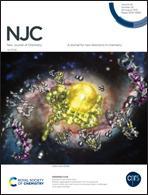A simple pyridine-based highly specific fluorescent probe for tracing hypochlorous acid in lysosomes of living cells†
Abstract
Hypochlorous acid (HOCl) with strong oxidation property plays an indispensable role in anti-pathogen invasion and maintains the cell redox balance. Lysosomes, as eukaryotic organelles, contain numerous hydrolases. Excessive concentration of HOCl can lead to the lysosomal rupture and release of lysosomal contents, thus affecting the normal function of cells. Hence, we developed a novel lysosome-targeted HOCl fluorescent probe, namely Lyso-PHE, whose lysosomal targeting property was derived from the pyridine unit. Probe Lyso-PHE has outstanding selectivity, ultra-high sensitivity (LOD = 16 nM) and rapid response towards HOCl. In addition, bioimaging and fluorescence co-localization experiments demonstrated that probe Lyso-PHE was proficient in tracing the endogenous and exogenous HOCl in the lysosomes of living cells.



 Please wait while we load your content...
Please wait while we load your content...